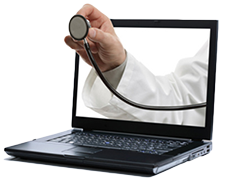Wednesday, October 29th, 2014
written by Elmer Bernstam, MD, MSE
 Have you searched the web for your symptoms in an effort to diagnose yourself? Have you ever made any decisions about your health based on that information, whether or not you ended up seeing a doctor? Then you’re more familiar with consumer health informatics than you might realize.
Have you searched the web for your symptoms in an effort to diagnose yourself? Have you ever made any decisions about your health based on that information, whether or not you ended up seeing a doctor? Then you’re more familiar with consumer health informatics than you might realize.
Consumer health informatics is the sub-field of biomedical informatics that deals with health care consumers’ use of health data, information and knowledge. Even though we may think of these consumers as patients, it’s actually a broader population that includes the medically well, patients’ families, and caregivers.
Many important themes have emerged within consumer health informatics including patient portals, patient-clinician communication, online health information, online communities and more. This post focuses on health information online and health-related online communities.
Every day more patients seek health information online than consult physicians (1). The Health Information National Trends Survey (HINTS) sponsored by the National Cancer Institute found that health care providers remain a trusted source of health information, but more respondents went online for health information before going to their physician (2). It’s because of this trend that clinicians, researchers, and health care consumers are understandably concerned about the accuracy of online health information (3-6).
Overall, consumers are generally satisfied with their online experiences and are making treatment choices based on the information they encounter (4, 7). Sometimes, patients don’t discuss their use of treatments found online with clinicians, but regardless, because so many patients do access health information online, clinicians are often faced with patients who have been informed—or misinformed—by the Internet (8).
Multiple studies (E.g., (3, 9, 10)) evaluated health websites and have found a great deal of false or misleading information. These studies became so frequent that they came to be known as studies of “information epidemiology” or “infodemiology” (11). In the end, there is little evidence of harm from online information (12), but we don’t know about unreported cases of harm. There is an old saying: absence of evidence is not evidence of absence.
An interesting twist on the debate regarding the accuracy of health information online is called the “self-correction hypothesis.” The hypothesis states that if consumers are able to comment on the posted information, as is the case in most online communities, then they will be able to identify false or misleading information quickly and reliably, even without oversight by a clinician.
Although there are only a few studies to this end, the available data support the self-correction hypothesis. Consumers have been able to identify false or misleading information posted to online forums focused on topics like breast cancer (13) and weight loss (14), specifically. Further, answers to actual consumer questions posted to a weight loss community were only slightly less accurate than answers given by practicing primary care physicians (15).
That said, it’s recommended that consumers always check with their health care provider before making decisions based on information found online.
Elmer Bernstam, MD, MSE will be teaching the “Consumer Informatics” course at SBMI in the summer semesters in both 2015 and 2016.
1Fox S, Rainie L. Vital decisions: how internet users decide what information to trust when they or their loved ones are sick. Washington, DC: Pew Internet & American Life Project2002 May 22, 2002.
2Hesse BW, Nelson DE, Kreps GL, Croyle RT, Arora NK, Rimer BK, et al. Trust and sources of health information: the impact of the Internet and its implications for health care providers: findings from the first Health Information National Trends Survey. Arch Intern Med. 2005 Dec 12-26;165(22):2618-24.
3Biermann JS, Golladay GJ, Greenfield ML, Baker LH. Evaluation of cancer information on the Internet. Cancer. 1999;86(3):381-90.
4Fox S, Rainie L. The online health care revolution: How the Web helps Americans take better care of themselves. Washington DC: Pew Internet and American Life Project: Online2000 November 26.
5Jadad AR, Gagliardi A. Rating health information on the Internet: navigating to knowledge or to Babel? JAMA. 1998;279(8):611-4.
6Price SL, Hersh WR. Filtering Web pages for quality indicators: an empirical approach to finding high quality consumer health information on the World Wide Web. Proc AMIA Symp. 1999:911-5.
7Helft PR, Hlubocky FJ, Gordon EJ, Ratain MJ, Daugherty C, editors. Hope and the media in advanced cancer patients. American Society of Clinical Oncology 36th annual meeting; 2000 2000; New Orleans, LA.
8Eisenberg DM, Kessler RC, Rompay MIV, Kaptchuk TJ, Wilkey SA, Appel S, et al. Perceptions about complementary therapies relative to conventional therapies among adults who use both: results from a national survey. Annals of Internal Medicine. 2001;135(5):344-51.
9Berland GK, Elliott MN, Morales LS, Algazy JI, Kravitz RL, Broder MS, et al. Health information on the Internet: Accessibility, Quality, and Readability in English and Spanish. JAMA. 2001;285(20):2612-21.
10Meric F, Bernstam EV, Mirza NQ, Hunt KK, Ames FC, Ross MI, et al. Breast cancer on the world wide web: cross sectional survey of quality of information and popularity of websites. BMJ. 2002 Mar 9;324(7337):577-81.
11Eysenbach G. Infodemiology: The epidemiology of (mis)information. Am J Med. 2002 Dec 15;113(9):763-5.
12Crocco AG, Villasis-Keever M, Jadad AR. Analysis of cases of harm associated with use of health information on the Internet. JAMA. 2002;287:2869-71.
13Esquivel A, Meric-Bernstam F, Bernstam EV. Accuracy and self correction of information received from an internet breast cancer list: content analysis. BMJ. 2006 Apr 22;332(7547):939-42.
14Hwang KO, Farheen K, Johnson CW, Thomas EJ, Barnes AS, Bernstam EV. Quality of weight loss advice on internet forums. Am J Med. 2007 Jul;120(7):604-9.
15Nelson S, Hwang KO, Bernstam EV. Comparing clinician knowledge and online information regarding Alli (Orlistat). Int J Med Inform. 2009 Nov;78(11):772-7.

Dr. Elmer Bernstam, MD, MSE is the Associate Dean for Research and a Professor at UTHealth School of Biomedical Informatics. He is a fellow of the American College of Physicians and the American College of Medical Informatics and is also board-certified in internal medicine and continues to practice. His research interests are in information retrieval, consumer informatics, and clinical decision support.